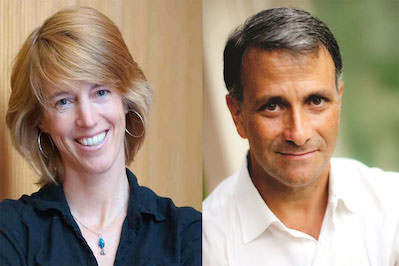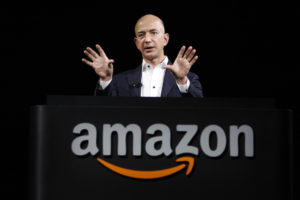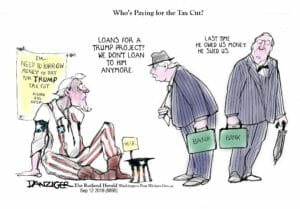Are Big-Business Subsidies Corporate Welfare or Good for the Economy?
Progressive icon Zephyr Teachout and felonious ex-lobbyist Jack Abramoff failed to convince a Manhattan audience on Wednesday that taxpayer subsidies for corporations should be eliminated. What went wrong?
The motion argued was whether or not to eliminate corporate subsidies.
Jack Abramoff and Zephyr Teachout argued that the culture around subsidies, which permeates politics and business, is so thoroughly corrupt that it cannot be reformed and therefore must be ended. Kate Gordon and Michael Lind argued that subsidies enable the private sector to develop technologies and provide services the public needs, with renewable energy being a prime example, so they should not be eliminated wholesale.
The audience voted before the debate, with 34 percent saying they were for the elimination of subsidies, 15 percent saying they were against and 51 percent saying they were undecided. After the debate, 36 percent of the audience favored the motion, 53 percent were against and 11 percent were undecided.
During the debate, Teachout urged listeners to “have faith in the intelligence of… people.” What then are we to make of the fact that those who heard her argument voted against it?
As her opponents Gordon and Lind acknowledged, the federal subsidy program does much harm at the moment, and it’s a moment that’s gone on for a very long time. But such problems exist throughout government and ebb and flow under the influence of a variety of factors. It seems a leap to say that in a political-economy that asks the private sector to provide many of the goods and services a population needs, a federal subsidy program could not be reformed successfully amid the kind of sweeping governmental and cultural changes that many Americans appear ready to support at present.
This view is probably at the center of the audience’s disagreement with Teachout. But the motion (Again: “Eliminate corporate subsidies”?) was absolute. Perhaps they would have agreed with her if she had been asked to argue a more nuanced position.
—Posted by Alexander Reed Kelly.
* * *8:23 p.m. EDT:
Moderator John Donvan thanks the debaters for making an arcane topic accessible. He asks for donations.
8:19 p.m. EDT: Teachout’s closing argument: I’m a Langston Hughes patriot: Let America be America again, “the dream the dreamers dreamed.” In this long, beautiful poem is a vision where no one is a beggar, even if they’re poor; each has an equal voice; no one is a servant of the other in a fundamental political sense. Michael and I disagree on where we see America now. Right now we are in a moment where we have a deep, deep crisis of corruption, and part of the reason is a handful of new political forces, big companies that have taken upon themselves the job of governing us. One of the mechanisms through which they extract wealth from our extraordinary economy is through corporate subsidies, and it’s one of the ways they develop relationships with politicians and government officials.
Lind cites examples of subsidies that worked—”tremendous unsung success[es].” Your loved ones or your own life may be saved by a particular subsidy for medical businesses. As long as that’s the case, you need to support subsidies.
Abramoff says we’re having two debates. One, wouldn’t it be great if we could do certain things with the government? Two, what actually happens in government? I was in those rooms and got to see what those conversations were like. I watched a company in pursuit of a tax break in the political process. Shamefully, I stayed there and watched and participated. Public servants are not all geniuses, and Washington, unfortunately, is about grabbing power. “The system we developed is so immensely corrupt that the American people are rising up, and we just need to join them. Vote for us.”
Gordon: Let me remind you of the proposition: Eliminate corporate subsidies. That’s an absolute motion. If you think that even one of the things that we raised tonight is a good example of a corporate subsidy, you must vote against the motion to eliminate corporate subsidies. If you think even one thing we mentioned is good, you must vote for us.
8:13 p.m. EDT: The rapid-fire “volley” round begins. Question: Should the government be in the business of picking individual companies to be winners, leaving the rest unfavored. Teachout says no; Lind says yes. Abramoff: “I agree with Zephyr.” Gordon: “If picked well, with a strong government,” yes.
8:10 p.m. EDT: Lind tells Abramoff that the government is not growing out of control, because the debt-to-gross domestic product ratio projected through 2040 is flat.
8:09 p.m. EDT: Question: In our global economy, are corporate subsidies necessary to compete internationally? Lind responds, “Absolutely.” Teachout said she rejects the existing trade paradigm, the idea that the horse is out of the barn. She says she believes the global trade scheme can be radically reformed.
8:07 p.m. EDT: Lind says some small businesses benefit from subsidies. Teachout responds that the exception does not beat the rule.
8:05 p.m. EDT: Question: Can you give an example of a subsidy that’s been sunsetted?
Gordon responds: The credits for wind and solar are sunsetted every year; renewables are renewed every year, and there are many others.
Question: I don’t remember the last time savings from subsidies were passed on to the public financially, Mr. Lind. Can you give an example?
Lind responds that when we’re talking about subsidizing business, we’re talking about not giving benefits to individual taxpayers, but benefits for the general public. Teachout says subsidies are only one example of providing support for a public need.
7:58 p.m. EDT: Question: What’s the optimal return on corruption? Lind responds that the U.S. is a high-trust society. Not only is the U.S. far less corrupt than many other countries in the world, in my opinion it’s less corrupt than in the past. I was born into segregated Texas, where conservative poll managers threw out Democratic votes.
Teachout responds that there are highs and lows of corruption through history. We should have faith in the intelligence of the people.
7:54 p.m. EDT: Question from the audience: Is the government capable of distributing subsidies fairly and justly? Gordon says yes. I don’t accept the proposition that government is inherently inefficient and corrupt. We have to have the hope and ambition for government to be able to make these decisions and make them well.
Teachout says the question goes to something else, which is competence. Figuring out the broad mission, government can do well. The particulars of the distribution are the low point at which government employees should be engaged.
7:51 p.m. EDT: Teachout speaks in favor of unleashing the renewable energy sector. Gordon says that if we eliminate subsidies, the renewable companies will run to other countries where they do subsidize energy.
Lind explains that the export-import bank subsidizes foreign purchasers of American goods. We are competing against European and Asian nations that view the government as the coach of their team, not the umpire.
Abramoff responds that we get into a dangerous mode when we start viewing government as our partner. Sometimes government gets into our liberty into a way we don’t like. The wisdom of the founders has to be considered. We’re talking about the elimination of federal subsidies, and some federal subsidies may be unconstitutional.
Lind responds that Alexander Hamilton wrote that the federal government should subsidize some industries. The Founding Fathers were not Ayn Rand.
7:44 p.m. EDT: Donvan asks Abramoff, can’t we get rid of the corruption, as Lind says? Abramoff responds that you can’t regulate away human nature, which involves a desire for money.
Gordon says she would favor greater transparency.
Teachout says of course we need public financing of elections, but you can’t do that alone, because if you create extraordinary temptation for 975 companies to go after money, they’re going to find a way to do it. [Teachout is referring to her earlier statement that 75 percent of all corporate subsidies are going to fewer than 1,000 companies.]
Question for Gordon: If today we could eliminate all fossil fuels subsidies, do you not believe that the radical elimination of those subsidies would do more than adding on to an already corrupt system?
She responds: No. Those subsidies have been in place for over a century. Even if you eliminated them today, it would still be an uneven playing field for newcomers pushing new technologies.
Donvan asks Abramoff, do you concede that subsidies for renewables are good? Abramoff responds that he’s against subsidies for fossil fuels, that he’s a conservative and doesn’t necessarily hate fossil fuels.
7:39 p.m. EDT: Round two begins, in which the debaters address each other. Donvan asks, is corruption inevitable? And must subsidies support the biggest corporations?
Donvan turns to Lind. Don’t Teachout and Abramoff have a point about corruption? Lind responds, “You have to judge things by results.” I understand Zephyr’s concern about the moral fabric of the republic. Isn’t a little corruption worth paying as the price of progress?
Abramoff responds: I was in the belly of the beast. I have to tell you, a little corruption is not acceptable, because it’s never just a little. Everyone is always corrupted. Every subsidy program is immediately set upon with 30,000 lobbyists. Subsidies are the starting gun of the race for corruption in Washington.
But things still get built, Donvan says.
Gordon interjects that corruption is a consequence of poor government. With good government we can avoid some of the corruption. I’m talking about agencies making decisions, not Congress. If you have a strong system, you can avoid a fair amount of the corruption.
Teachout says we are in terrible shape with respect to corruption in this country right now. We have a huge corruption problem in Congress and with capture of the federal agencies, which are softer and less explicit. The financial incentives of the people who oversee pipeline approval are to approve the pipelines. There’s a real danger in saying, “There are always problems and some good things happen.” We have a crisis and have to act now.
Lind replies, why not just address corruption at the source: campaign finance? What if we forbid lawmakers from becoming lobbyists? The audience applauds. Subsidies are not the crux of the problem—Congress is.
7:27 p.m. EDT: Gordon: Mike and I are not absolutists. We conceded that there are bad subsidies.
Subsidizing energy, a big one, is not new. Today we’re looking at subsidizing a transition away from oil and toward something different. We give low-income consumers a subsidy to help them pay their energy bills. That’s a corporate subsidy, but it’s one that provides a public service that is not otherwise served by the public sector.
Climate change is the gorilla in the room. Threatening as the problem is, why would the private sector invest when the risk of financial losses are so great? If you don’t like government intervention, wait until climate change. FEMA will be taking over towns.
I agree with Zephyr—I would rather see a price on carbon and regulation. This shouldn’t be a debate about whether subsidies are inherently corrupt. Are there bad ones? Yes. [Gordon lists subsidies that she says have unambiguously served the public good.] If we end corporate subsidies, we undermine our ability to address climate change.
7:21 p.m. EDT: Our subsidy policy is turning us into beggars, sycophants and competitors for public cash. This sets communities against each other and undermines the fabric of the community. We have a tradition of rejecting a culture of bootlickers and flatterers. We should not be that culture. This is “a core question about who we are, about democracy, about corruption and about our future.”
7:14 p.m. EDT: Teachout: Get away from the little examples. We have a crisis of corruption, and a key driver is corporate subsidies. I’ll talk about three things, how subsidies are used only when law and all other interventions have failed, and are thus a moment of failure, not success. Second, how the rise in corporate subsidies has led to a devastation of our small business economy, the heart and soul of America. Third, how corporate subsidies changed who we are as “small-d” democrats.
Like Michael, I believe the government has a role in determining society. The best way for government to intervene is to set rules that enable good utilities to come about. Second, I believe in small businesses. It’s where community happens. It’s where we find the next best thing. And they can’t survive. All the big boys are coming in with the cash and the handouts, and we can’t compete, a diner owner told her. Seventy-five percent of all corporate subsidies are going to fewer than 1,000 companies. This is a handful of big lobbyists who use their monopoly power to get government money. And they use small governments as fronts. The overwhelming majority is going to big agriculture, and subsidies are being pitted against subsidies, inefficiently.
7:14 p.m. EDT: Our opponents will tell you we have to throw the horse out with the manure, the good subsidies with the bad, Lind says. Don’t do that.
7:12 p.m. EDT: Lind begins with an analogy about ponies that demonstrates the tax code is full of bad subsidies. Isn’t this guy supposed to be arguing in favor of subsidies, he asks. I’m not in favor of all subsidies, but there are some significant public objectives that make corporate subsidies appropriate. The good and the bad have to be disentangled. There are two kinds of corporate subsidies: good and bad.
Three tests for distinguishing good from bad subsidies: One, would the industry do this on its own anyway? If so, the taxpayer is being swindled.
Second, can this public objective be more efficiently pursued by other means? We do some things directly from public agencies—we don’t hire pirates, after all. We have the Navy. If we’re not going to nationalize various necessary services, the government has to come up with other means to finance and pursue them if the private sector cannot do it on its own.
Third, do the benefits outweigh the costs?
7:06 p.m. EDT: For every dollar given out in subsidies, Abramoff says, there are 10 lobbyists chasing after it. Unfortunately, we have a culture in Washington that is about taking our money and giving it out to people who can lobby for it the best … and unfortunately we live in a culture where money goes first to corporations. I wouldn’t eliminate everything, but unfortunately the culture itself is pervasive and corrosive. So I hope you’ll join us to eliminate corporate subsidies.
7:02 p.m. EDT: Round one begins. The question is asked: Limit corporate subsidies? Abramoff goes first, and he’s a charmer. “If someone told me I’d be here arguing against corporate subsidies,” he would find that about as believable as a successful presidential run by Donald Trump.
“Subsidies … are driving the nation in a direction that is very troubling,” he says. Let’s define the word first. Most of the conversation needs to focus on the vast amount of money that is either given to corporations or that corporations are allowed to keep. I’m going to argue that we can’t afford subsidies economically, politically, ethically, etc. We have $20 trillion of debt, and the fact that Congress gives about $100 billion a year-plus in corporate subsidies and tax breaks, “that’s a big chunk of the annual deficit that we run.”
6:58 p.m. EDT: Gordon and Lind are introduced. The audience is told to cast the evening’s first vote.
6:54 p.m. EDT: After being introduced by Donvan, Abramoff says limiting subsidies is very difficult but possible. He introduces Teachout, his debating partner, who, when asked whether it’s possible to succeed in politics without getting one’s hands dirty with dirty money, so to speak, responds: “It’s really, really, really hard, and I’m gonna do it.” The audience applauds.
6:52 p.m. EDT: Donvan brings the debaters onstage and lists a handful of U.S. corporations and the multibillion dollars in subsidies they receive.
6:46 p.m. EDT: Donvan welcomes the audience and explains the voting process by which they will select the debate winner.
6:39 p.m. EDT: Attendees file in. The steady, industrial pulse of Donna Summer’s 1983 hit, “She Works Hard for the Money,” fills the room.
* * *
Cars, agriculture, energy. These industries benefit from government subsidies in the form of loans, tax breaks, regulations and other preferences that critics on both the left and right say transfer wealth from taxpayers to corporations and distort markets and the economy.
Proponents, meanwhile, talk of government’s role as a “strategic investor” that supports innovation and helps U.S. companies, the economy, and by extension, Americans, thrive.
But is that the effect? Or are these subsidies actually an unjust system of corporate welfare?
Arguing for the latter view in a debate hosted by Intelligence Squared U.S. at the Kaufman Center in New York City is an unlikely pair: New York progressive, Fordham University law professor and anti-corruption activist Zephyr Teachout, and Jack Abramoff, the conservative superlobbyist who spent four years in prison for his felonious role in one of the early 21st century’s most infamous lobbying scandals.
Arguing in favor of subsidies are Kate Gordon, vice chair of climate and sustainable urbanization at the Paulson Institute, and Michael Lind, co-founder of New America.
Truthdig will blog the debate, starting at 6:45 p.m. EDT Wednesday. Watch the live stream and follow along here, and check back Thursday for a full transcript.
—Posted by Alexander Reed Kelly.
Your support matters…Independent journalism is under threat and overshadowed by heavily funded mainstream media.
You can help level the playing field. Become a member.
Your tax-deductible contribution keeps us digging beneath the headlines to give you thought-provoking, investigative reporting and analysis that unearths what's really happening- without compromise.
Give today to support our courageous, independent journalists.






You need to be a supporter to comment.
There are currently no responses to this article.
Be the first to respond.